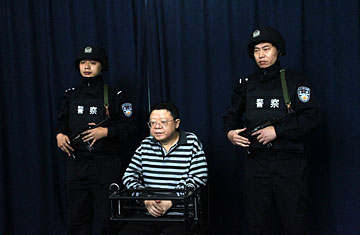
In Chongqing, China, top judicial official Wen Qiang has been accused of protecting businesses in real estate, prostitution, gambling, transportation and illegal loans
Call it China's trial of the 21st century. Not since Mao Zedong's wife and her fellow members of the reviled Gang of Four were tried in 1980 has a courtroom trial so captured the attention of the nation. For one thing, there's the sheer scale of the operation that brought more than 30 defendants to court this week: a crackdown on the alliance of criminal gangs and their corrupt official collaborators who have terrorized a huge metropolis for years. Thousands of suspects were questioned, some 1,500 were arrested, bribes in the tens of millions of renminbi were revealed and nearly a quarter of the city's police force was devoted to the ongoing investigation. Even more astonishing — almost unprecedented — is the fact that so many senior police officers and government officials are on trial, virtually all of them stalwart members of the ruling Communist Party.
So unprecedented are the events unfolding in Chongqing, Sichuan province's largest city, that they are raising a slew of questions about their significance among both Chinese and foreign analysts. Could this be the beginning of a nationwide crackdown on corruption? Could the revelations about the role of the party damage the confidence of ordinary Chinese in their rulers? And is this really about corruption, or is it yet another manifestation of an intra-party struggle for power?
"The gangster trials in Chongqing bear great significance in the [national] anti-corruption campaign," says Ren Jianming, who heads the Research Office Against Corruption at Beijing's prestigious Tsinghua University. "The fact that it started in Chongqing is more likely a result of political conflicts from within the party, and it's mainly orchestrated by the local government. I believe the Chongqing trials are the beginning of a string of anti-corruption campaigns, but it's still unclear just how far the government will be willing to go."
It will be some time before the answers to such questions are reached, but in the meantime, the investigation in Chongqing continues to expand. On Wednesday, six of the alleged ringleaders were sentenced to death for murder, assault, extortion and other organized-crime-related charges. The death sentences were part of two cases involving a total of 31 defendants, some of whom have already received sentences ranging from one year to life in prison. Senior party member Liu Guanglei told reporters that 16 top police and judiciary officials were involved in the investigation, including Chongqing's top judicial official, Wen Qiang. He has been accused of protecting businesses in real estate, prostitution, gambling, transportation and illegal loans. Another three cases are still under way.
The Communist Party's near obsession with secrecy means that finding out who is the driving force behind something as momentous as the Chongqing trials is close to impossible. But local media reports have singled out Chongqing party secretary Bo Xilai for praise. Bo was appointed to administer the sprawling municipality of nearly 30 million in August 2008. Known for his imperious manner and impeccable revolutionary lineage (his father was one of the so-called "eight immortals" of the party, its senior-most leaders), Bo had established a reputation for anti-corruption drives in the showcase city of Dalian when he was party secretary there. Though reports say the Chongqing investigation was under way prior to his appointment, Bo's previous record and the fact that the cases have come to fruition on his watch means that much of the credit is accruing to him, probably deliberately.
"There's clearly a concerted effort by sections of the party to give credit to Bo and make him more of a political rock star," says Beijing-based analyst Russell Leigh Moses. "He's popular among the younger generation, and to some extent is emblematic of new thinking and a new approach to politics."
Bo is also famous for his ambition, a reputation reflected in Chinese online posts, some of which pondered whether the Chongqing anti-corruption drive had more to do with personal ambition than rooting out wrongdoing. And while other online writers wondered about motives like intra-party factional wrangling, Moses points out that the upper echelons of the party are all too aware of the seriousness of the nationwide corruption problem and the need to address it. Whatever its genesis, Chongqing does serve as a powerful warning signal to administrators in other parts of the country, says Moses. "It says in no uncertain terms, you wrap this up yourselves, or we'll come in and do it for you."
